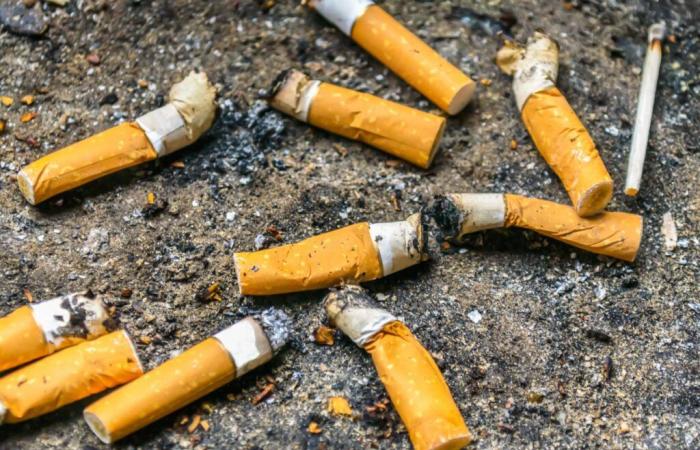
On November 25, the Council of State rejected the appeal of British American Tobacco and JT International which contested the objectives imposed by the State on Alcome, the eco-organization of the sector, in charge of cigarette butts, composed of representatives of the tobacco industry. The court ruled that the Ministry of Ecological Transition was fully authorized to impose waste reduction objectives on Alcome, while respecting the legal framework. In addition, the financing of the costs of cleaning up cigarette butts thrown on the ground was deemed to be in compliance with the law.
These objectives provided for a reduction in cigarette butts thrown into the environment by 20% in 2023, 35% in 2025 and 40% in 2026 compared to 2022. The Council of State confirmed that these targets respected French legislation and European directives, notably the 2008 waste framework directive[1].
An action brought by manufacturers British American Tobacco and JT International
The contested specifications set defined objectives for reducing cigarette butts illegally thrown into the environment. These objectives are based on article L. 541-10 of the Environmental Code, which empowers the State to impose measures on producers aimed at limiting waste from their products.
Tobacco manufacturers, including British American Tobacco (BAT) and JT International (JTI), had filed an appeal deeming these objectives excessive and contesting their legal basis. The Council of State rejected these arguments, considering that the timetable was reasonable and that the organization had received a precise methodological framework for evaluating abandoned cigarette butts. The Council of State also considered that these measures were fully compliant with European law. He also clarified that responsibilities were shared between the eco-organization, local authorities and the State, thus guaranteeing balanced application.
Alcome has already been sanctioned on several occasions for non-compliance with its obligations by the Ministry of Ecological Transition and Cohesion. In 2023 and 2024, fines totaling €1.16 million were imposed on it for delays in implementing collection devices, such as street ashtrays. This measure has been contested since the implementation of Alcome by tobacco producers, like many other obligations, which they consider too costly[2].
A supervised financial contribution
One of the other points of contention concerned the estimated costs of cleaning up discarded cigarette butts, estimated at €96 million per year. This figure is based on a pollution index based on approximately 4,700 tonnes of cigarette butts found on French territory. Tobacco producers contested these calculations, but the Council of State rejected their argument, deeming the estimates proportionate and transparent.
The system also provides for a re-evaluation mechanism based on data provided by Alcome. In addition, communities receiving funding must justify actions undertaken and provide concrete evidence of the operations carried out. Furthermore, according to French law, the eco-organizations concerned are supposed to finance “the costs of collecting and processing abandoned waste”. The transversal decree of November 2020 provides that they must finance 80% of these costs.
Exclude the tobacco industry from the REP sector mechanism
These developments are part of an international context marked by negotiations on a global treaty aimed at combating plastic pollution and developing the establishment of extended producer responsibility (EPR) sectors. The National Committee Against Smoking (CNCT) underlines the importance of integrating the issue of tobacco waste, particularly cigarette filters, into these discussions but also of excluding the tobacco industry in the establishment of the EPR sector. for tobacco products. For the CNCT, the appropriate eco-organization should be independent of tobacco manufacturers, the contribution of the latter having to be limited to the sole financing of the system, according to the polluter pays principle. The justification for the exclusion of tobacco manufacturers from the system lies in particular in the particularity of this industry whose interests are legally recognized in the WHO treaty the Framework Convention on Tobacco Control as being opposed and irreconcilable with those of health. human and environmental.
In France, Alcome places the responsibility for cigarette butt pollution on the incivility of its consumers, who should be better educated. In doing so, nothing is said about the direct responsibility of tobacco manufacturers and their products in this major environmental pollution. The current system also offers them an opportunity to communicate by offering an image of respectability and legitimate actor participation in decision-making. They are in a position to enter into contracts with local authorities, which is contrary to the international commitments of France which has ratified the WHO Framework Convention on Tobacco Control (FCTC)[3].
©Tobacco Free Generation
AE
[1] REP tobacco: the Council of State validates measures to combat abandoned butts, published on November 26, 2024, consulted on December 19, 2024
[2] Generation without tobacco, The eco-organization Alcome condemned once again by the State, published on June 26, 2024, consulted on December 19, 2024
[3] Press release, The Alcome eco-organization condemned once again by the State, November 2024, consulted on December 19, 2024
National Committee Against Smoking |





